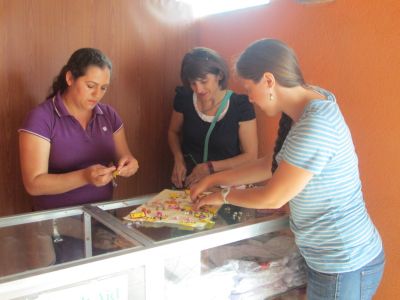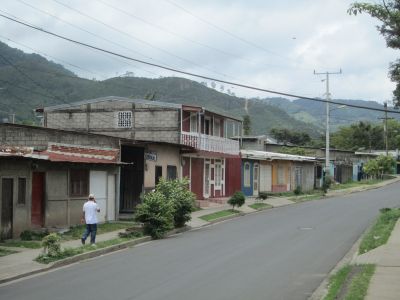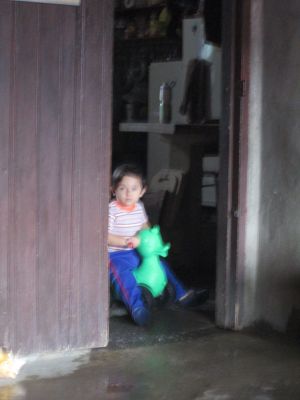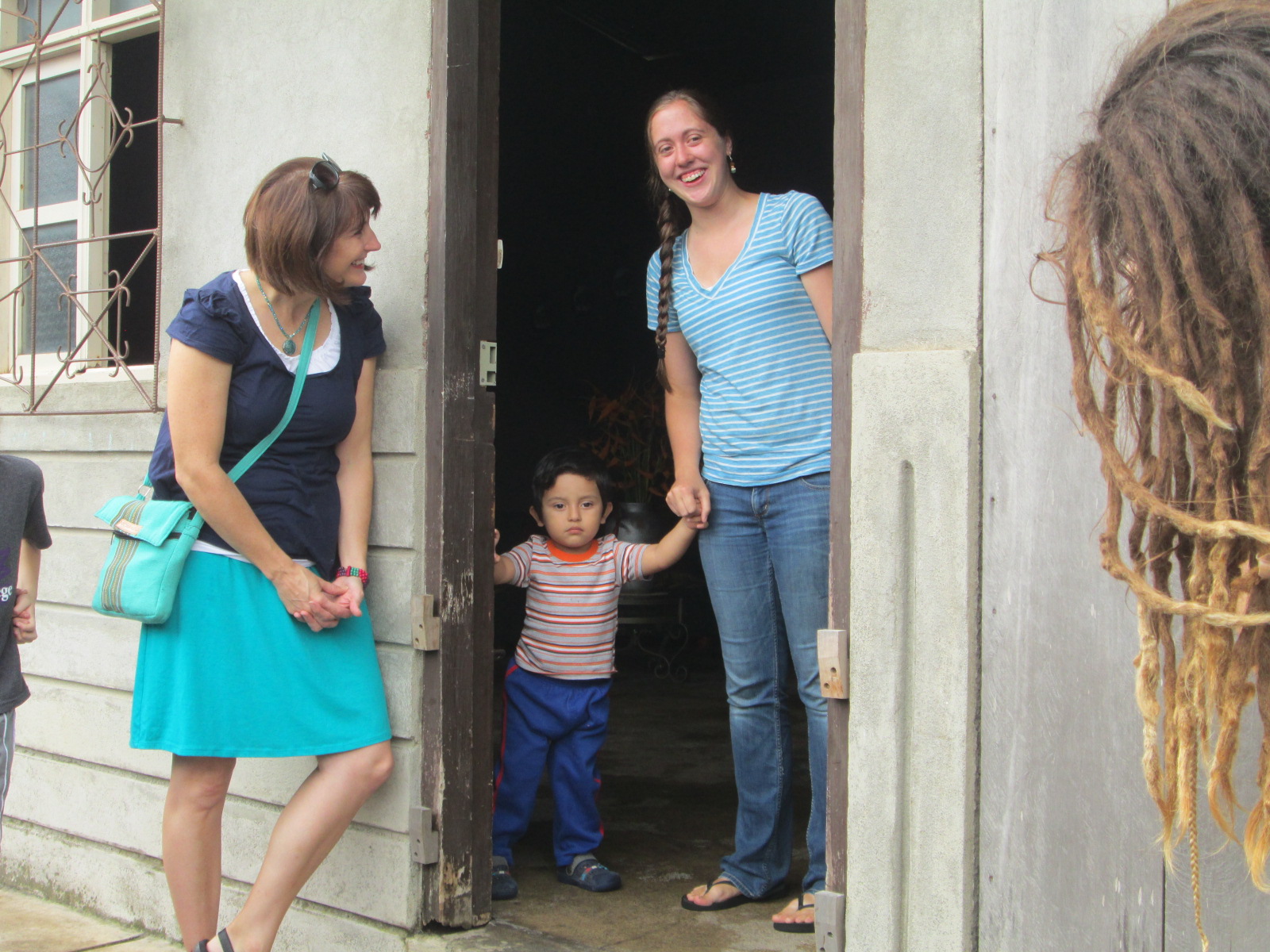A Day in the Life…Jinotega
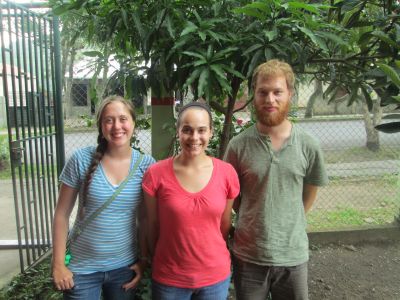
EMILY SCHROCK, BEN SHELLY, and MOLLY ZOOK are all spending their service term in the northern mountain city of Jinotega.
Emily works in the mornings at a school for children with special needs and the organization, Casa Materna in the afternoons.
Ben works in a junior-senior high school assisting students with learning English.
Molly works in the mornings at the same school Emily does and works especially with deaf students. She spends her afternoons at Mayflower, a boarding school for Nicaraguan deaf children.
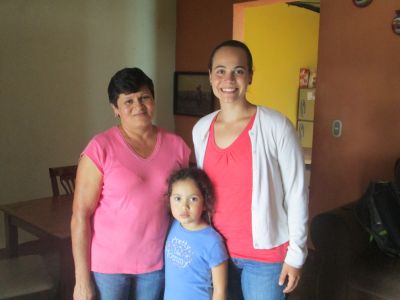
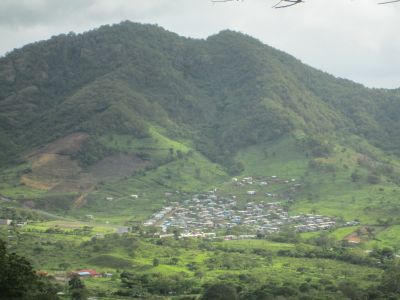
JOURNAL EXCERPTS BY MOLLY ZOOK:
“Living in Jinotega is beautiful. The city is in the valley, surrounded by mountains every way you turn. When looking up, you can see the shadows from the clouds, coffee fields off on one peak, and on the opposite side, the cross. The mountains are covered by rich green trees and grass both growing plentiful. If you climb to the top of the mountain where the cross is, off in the distance, you can see the lake where there is a dam. It generates electricity to help power Jinotega and large parts of Nicaragua.
There are many more farms that then surround the outskirts of the city as well as around the mountains. This is much different from everything I know in Carazo. A flat area that is busy and connects one city right into the next almost seamlessly.”
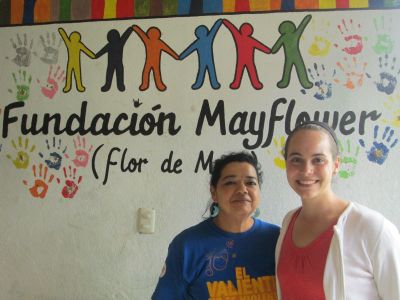
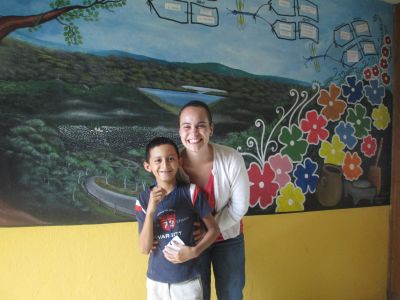
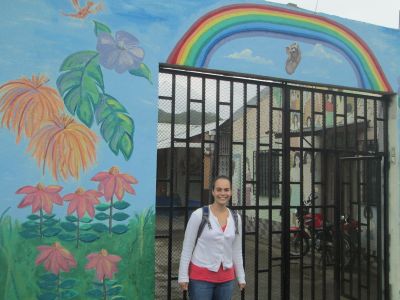
“It has been interesting to learn about ‘being’ and ‘doing’ while on service. I feel that I have at last been able to break from my ‘normal’ American routine. I feel more at peace to go with the flow and take time for myself. The laid-back nature of the Nicaraguans helps me because I can follow their lead. While on service, I have had to learn how to just be. This has been most important when I go to school with the kids. I tend to sit and watch what they are doing. Every once and a while I get to join in to help the students or talk with the teachers. I am typically in conversation with one of the sign language teachers. My time in the morning seems so laid back. It seems almost comical that I call it work…
…in the afternoons, my service is me more just interacting with the kids and being a new face at the Alberaque/Mayflower. I don’t feel like I do much work besides being a presence. I hope that my presence and offer of love is enough. For me personally, it is fulfilling. I have found peace in ‘being’ and am happy to break from ‘doing.’ ” [Since Molly wrote this journal entry early in her service period she shared verbally with us that she has been able to be even more hands on and helpful with the children in her school. Her role feels less laid back but still very fulfilling.]
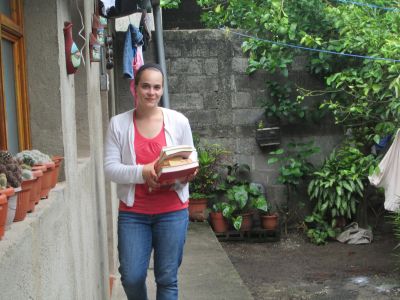
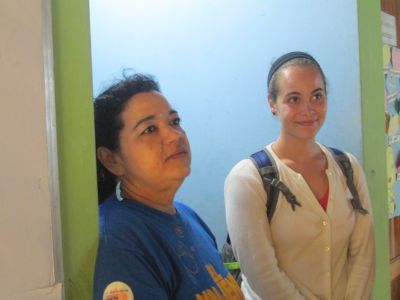
“Language is a peculiar thing. Something that can connect people, create friendships, express emotions and needs, and bind cultures. Language stretches across time. It changes with people and how they want to use it…or how they need to use it. Linguists think there are between 3,000 and 6,000 languages around the world. Some are so old, some have even died that no one can understand them, others have just been born. Here in Nicaragua, I have been blessed to encounter one of the youngest languages in the world. Nicaraguan Sign Language came about in 1980 from my understanding. My interaction with it has been positive and I enjoy being able to see how Spanish is intertwined with it. What I didn’t expect was how much of a struggle it would be to navigate between four languages….I use English, American Sign Language, Spanish, and Nicaraguan Sign Language and have conversations in each language…The learning curve that comes with a new language can be eased by the people you interact with. And I am glad to have found this fourth language.”
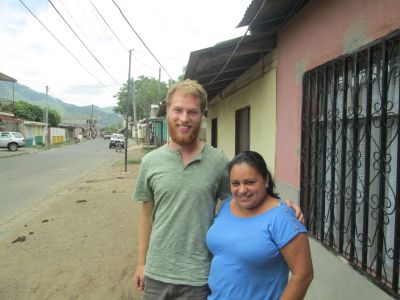
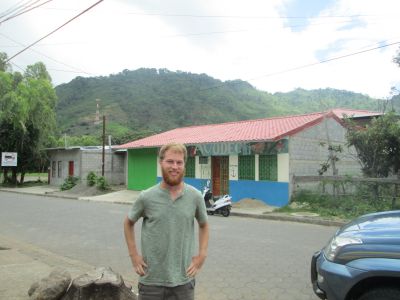
JOURNAL EXCERPTS BY BEN SHELLY: “One cannot describe Jinotega without mentioning the mountains. The two ridges, filled with patches of trees, grass, and boulders, are always visible and a constant reminder of the natural world’s presence and importance to Jinotega. The elevation provided much cooler temperatures than Carazo, as well as an ideal climate for harvesting coffee. However, despite the drop in temperature, the sun is just as present and powerful as in elsewhere in Nicaragua, as I have had to learn the hard way with two sunburns. Animals are a common sight, but rarely wild ones. Livestock occasionally wander the streets ahead of a farmer, horses munch on the mountain grass and dogs—both feral and owned—roam the streets day and night.
There are many ecological concerns for Jinotega. Climate change and rising temperatures could affect the coffee production, which is central to Jinotega’s economy. It relies on cool temperatures for optimal growth. There have also been water issues: droughts in the dry season and excess rain in the rainy season. The latter doesn’t usually seem like a big deal, but I have heard that farmers are much more concerned with too much rain than not enough. There is also the fear of depleting resources, as trees continue to be chopped down throughout the mountains to make way for new houses, and increasingly American-owned farms.”
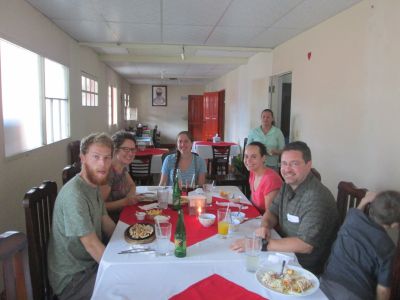
“There is certainly no such thing as a ‘typical day’ in my service assignment. Thus far my job at the 7th through 11th grade school, Benjamín Zeledón, has been filled with challenges and surprises. On a typical day my alarm sounds at 5:30am (though our friendly neighbor rooster makes sure I’m up by 4:45am) and I quickly prepare for the day. I leave the house between 6:20 and 6:30am and walk for about 35 minutes to school. I join all of the teachers in their lounge of sorts, talking and waiting for classes to begin. At this point the routine ends, so I’ll just explain what I did yesterday: First I helped Doña Pearla with her 7th grade class, then proctored an exam for Spanish class, then spent about 10 minutes looking for Doña Margery and asking students where she might be (in a school of 2500 students there are no numbers on rooms, and professors switch every 45 minutes to new rooms; it appears that they don’t even know where they’re headed next until they spot their next students), then I helped her for three of her classes before returning (after a search) to Doña Pearla. ‘Helping’ the teachers includes calling roll, grading homework, teaching a lesson, grading presentations, helping with pronunciation, working individually with students, and a lot of chatting with the teachers as the class of approximately 50 students walk in and out of the room…Shortly after 12pm I walked home, ate lunch, and spent the afternoon doing odds and ends with my family: washing dishes, preparing food for dinner, watching/playing with the young and rowdy kids next door, etc. I try to go to bed as early as possible to have energy to it again the next day.”
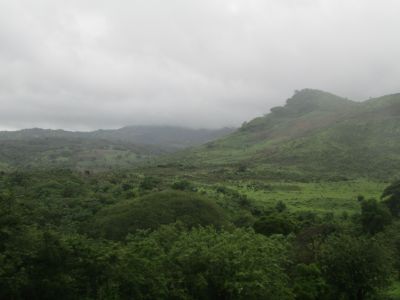
“Walking has been greatly important to me for my service experience. I walk a minimum of two hours every day; during weekdays, a little over an hour walking to and from school (occasionally twice), and a long, wandering walk in the late afternoon or early evening…My favorite ‘wandering’ walk is to head north from my house, leaving the border of Jinotega within five minutes, and circling around to a highway of sorts that takes me back to the other corner of the city. From there, I can see the cathedral next to the central park, and with it in my sights I take new side streets, crisscrossing and exploring until I reach the park. After spending some time there, it is a straight shot back to my house. Discounting the time in the park, it’s about an hour of being lost in my head as my feet plod along, mostly aimless and simply curious. I’ve stopped and chatted multiple times with people curious about who I am and what I am doing here. I’ve also encountered many buildings and people that have provided valuable interaction for my project on English education in Jinotega. It has been an important method for me to reflect on SST, life after SST, how to manage myself and the craziness of Benjamín Zeledón school and just appreciate being in a foreign country and culture.”
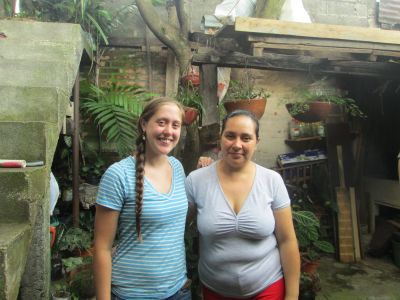
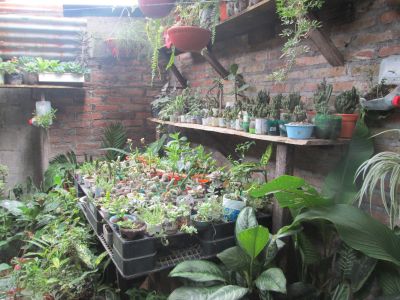
JOURNAL EXCERPTS BY EMILY SCHROCK:
“During my time in Jinotega, I have been given the chance to adventure alongside my two-year-old host brother, Jahir. I have only had 2 years between myself and my youngest sibling, so a 22 year gap was a totally new experience. I am slightly surprised that I am collecting life lessons from my little guy. The perspective of the world for a 2 year-old is limited, generally mamas, papas, and other immediate family and neighbors. When a new person enters the world of a 2 year-old, it can be confusing. It is easier to relate everything new about this person to what is already familiar and known. ‘That is the book of Mama,’ ‘That is the shirt of Carlos,’ ‘That is mine!’ The perspective of a 2 year-old can often be centered around what is relevant to their life. Welcoming a new perspective or another part of the world to theirs, doesn’t happen easily. There are, however, many positive ways that Jahir approaches life. He imitates daily tasks that he sees. He may not know why he does them, but he notices that they are important. He repeats words that people say because he notes that communication is important…Seeing another part of the world for the 1st time is like becoming a 2 year-old. At first it is much easier to notice everything that is like ‘your world.” Everything may look different but essentially needs are the same around the world…All of the sudden your world is a bigger place, and you are able to grasp or begin to grasp what that actually means. I am no longer just a stranger visiting Jahir’s house. Now, it is ‘The boots of Emily, the water bottle of Emily and Emily who plays with me and sneaks hugs.’
Nicaragua is no longer just a place I have visited but a place that I have become a part of as I wash dishes, wash tiny hands, and laugh with my family because I know what I said was funny, or actually interpret that they are telling a joke. My world is bigger and better.”
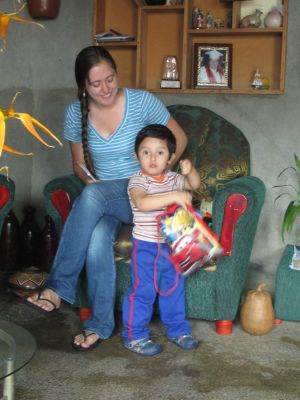
“I begin my day at Max Senqui [a school for children with special needs] in Professor Perla’s classroom of 7 students. Max Senqui is a specialized school that supports students with special needs. In my classroom there are students who have Down Syndrome and other mental difficulties. We begin with songs, check-ins about feelings, and roll call. Then I help support students as they practice identifying and match words or letters in their language notebooks. We also have breakfast and recess. After recess the classes change by day.
I then return home for lunch, and often jot down something about my day after Jahir goes to nap. I then go to Casa Materna, [an organization for expectant mothers especially in their final 3 weeks of pregnancy], in the afternoon. During the afternoon we usually have some time for preparation. I usually work on my Bingo game using the computer or prepare the materials for the charla (lecture/discussions). For example, making a poster, gathering items for a game or setting up equipment. During the charla, I have supported by leading or modeling questions or demonstrations a couple of times, but I mostly watch, listen, and answer questions.
After the charla we usually have an educational exercise that relates to the charla or an activity that will help pass the time. We have made origami, chappas (earrings), and made/drawn pictures. During activities we are able to talk and get to know our guests in a more personal manner. The pregnant women are from the campo/countryside mostly, but there are also some from the city too. Education opportunities are limited in the country and Casa Materna takes the time that they have and provides education that promotes their health, safety, and empowerment. I am definitely having a huge learning curve and getting to meet/know many wonderful women.
I then return home at 5pm and spend time with my family and sleep! Spanish makes my brain tired!”
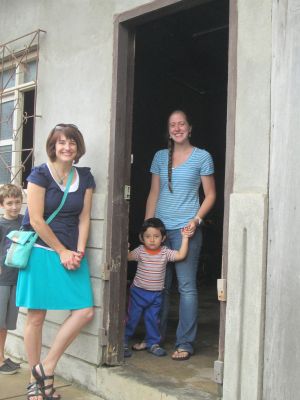
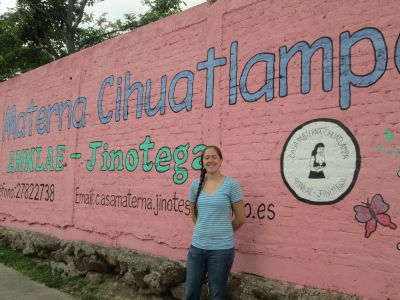
“For my sanity, I rejoice that I took Bob’s words seriously about how service may be more ‘being.” I needed to be prepared so I am grateful for having a heads up. My time at the school thankfully has had both being and doing….Casa Materna has little doing for me and a lot of being. I have been able to help with crafts, posters, and I made a “chalupa” which is a Spanish Bingo. Those things make me feel helpful, but for the most part, I am just being as I try to understand expectations and lectures in Spanish with limited technical Spanish vocabulary….My understanding that ‘being’ may be a more accurate description of this time is helping me relax with what I cannot change. I think an education in Spanish about motherhood is a positive experience I will be grateful to have even if I don’t feel so helpful.”
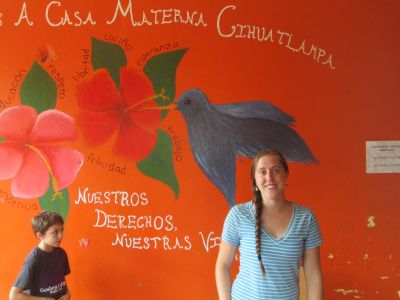
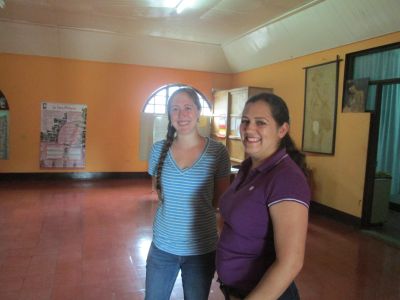
“Time is different here. There seems to be more of it. Here people take their time. “Tranquila, tranquila, and tranquila.” It has been one of the hardest adjustments for me, because I had been desperate for time, before SST. I needed it, and there wasn’t enough. I needed time to mourn {Emily lost a close loved one a couple of months before SST} and time to soak in how all the support of those who have touched my life means for my future and character. My heart belongs to more than one place now-Delaware, Indiana, and Nicaragua because of all the paths I have crossed….I hadn’t really had time to absorb my loss. But I am making peace with it here, here as I find home again. Home is important, and it can be found wherever you make connections and investments in people. I know that everyday as Jahir watches and waves as I walk to school that I have found home in Jinotega.
Time here with these different priorities are allowing me to make peace and find strength and not be afraid to connect because of the fear of loss. Goodbye is going to be hard but that just means that I have found another piece of home.”
